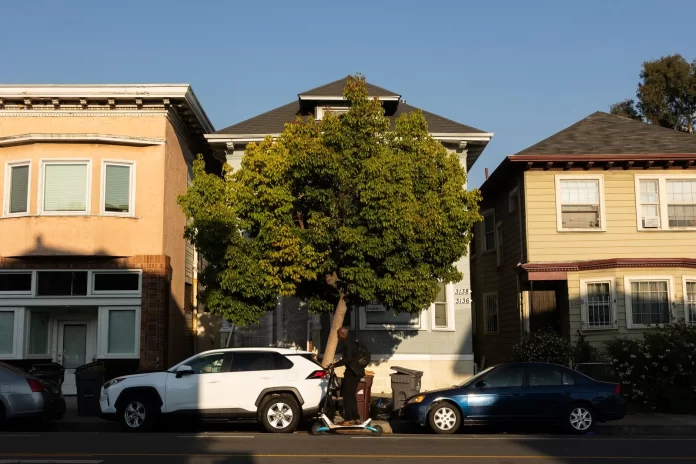The City of Oakland has been awarded $8 million in federal funding for tree-planting projects. The money is part of a larger United States Department of Agriculture initiative to help plant more trees in urban areas nationwide.
Secretary of Agriculture Tom Vilsack announced Sept. 14 that the Forest Service’s Urban and Community Forestry Program has awarded over $1 billion in funding for grantees across the nation. The 12th district in California, represented by Congresswoman Barbara Lee, received $9 million, with $8 million specifically earmarked for Oakland and $1 million going to Berkeley. The funding was made available through the Inflation Reduction Act. Both the grantees and the Urban and Community Forestry Program utilized the Climate and Economic Justice Screening Tool to help identify which communities would benefit most. The money will be disbursed in the coming months.
Miranda Hutten, urban and community forestry program manager for California, Hawaii, and U.S. Affiliated Pacific Islands, said a unique thing about the grant is that it doesn’t require a local government or organization to match funds, making it more accessible to budget-strapped cities, counties, and non-profits.
“It’s really hard, especially for smaller communities to come up with that match,” said Hutten. “So for every dollar we’re supposed to require a local dollar in matching. This is different.”
Hutten noted, however, that the program received numerous competitive grant applications which resulted in some of the grantees receiving a portion of the funding they originally applied for.
Oakland applied for the grant in June, asking for $22.5 million. The grant was drafted with input from two non-profits: the Oakland Parks and Recreation Foundation which is focused on equitable investment in city parks, and Common Vision, an East Bay-based organization dedicated to planting and managing school gardens in OUSD, food recovery and distribution, and planting trees. A spokesperson for Oakland said that the city intends to partner with non-profit groups. The city will perform street maintenance while non-profit partners do community engagement, tree planting, and workforce development. Oakland is awaiting specifications from the Urban Forestry and Community Program, to determine exactly how and when the money will be distributed.
Oakland Parks and Recreation Foundation Executive Director Mandolin Kadera-Redmond said that while Oakland had asked for more funding she is excited about what the $8 million will bring to communities in need of more tree canopy.
Urban tree canopy refers to the amount of leaves, branches, and stems of trees that cover the ground in an area when viewed from above. According to the U.S. Forest Service, increasing tree coverage and greening can reduce peak temperatures, improve air quality, reduce stormwater run-off, and provide vital wildlife habitats, among other benefits.
The Oakland Parks and Recreation Foundation has been focusing on urban tree-planting efforts in several neighborhoods around the city, including key areas in East Oakland. Kadera-Redmond said these areas are in dire need of greening due to poor air quality and the urban heat island effect—increased temperatures due to the disproportionate amount of concrete and buildings.
“These communities that were neglected in a lot of ways and were not getting the same kinds of services, these are the same neighborhoods that are now in these heat and food deserts,” Kadera-Redmond said. “They’re hot, their air quality is poor, and they have less access to fresh fruits and vegetables.”
Wanda Stewart, executive director of Common Vision—which is focused on improving West Oakland—said she intends to use this grant as an opportunity to bring the city and community members together, build relationships, and educate people about environmental stewardship in the neighborhoods that need it most. As a woman of color at the head of an environmental organization, she wants community members to see themselves reflected in the people leading and participating in these tree-planting efforts. Stewart believes her identity and leadership are vital to help reach Black and Brown communities typically left out of these efforts.
“It’s not just planting trees, it’s not just feeding people, it’s not just planting gardens, it’s growing a community that thrives,” Stewart said.
Kadera-Redmond also emphasized that trees not only improve people’s health and the environment but help foster a sense of community as well. She has hope that this initiative will prioritize tree planting in the areas of need—including the planting of fruit trees for individual community members—as well as the long-term care of these trees.
“This is something that Oakland has really recognized; the relationship and collaboration with working with volunteers are we come back and we check on [these trees],” Kadera-Redmond said. “We all have our favorite tree on the block, that we all know is protected, and watered, and taken care of, and honored. You get to go away to college and come back and it’s still there because the neighbors are taking care of it. That long-term stewardship is an ideal of any community that we’re not only taking care of our physical environmental spaces but each other.”
oaklandside.org
https://oaklandside.org/2023/09/20/oakland-federal-grant-urban-tree-planting/













